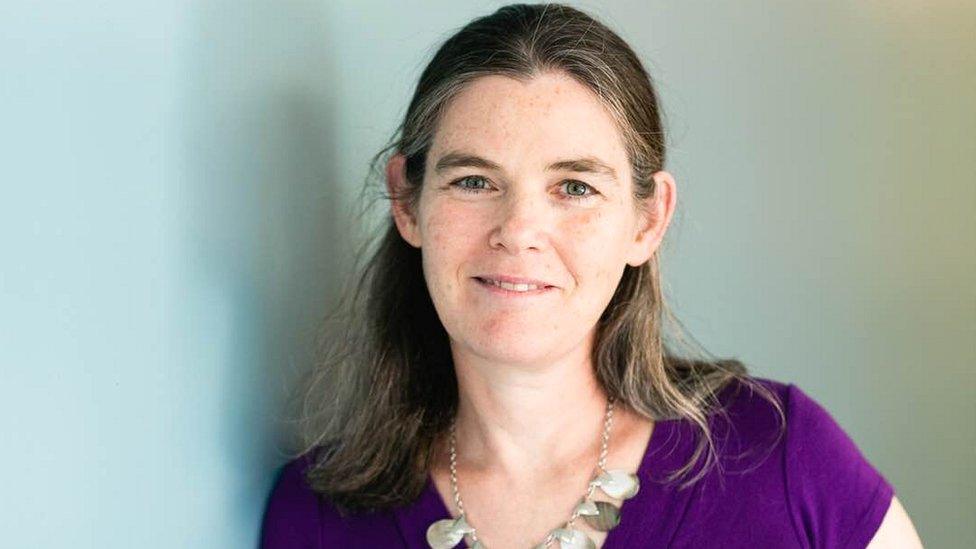'Top universities to offer full degrees online in five years'
- Published

Leading universities will offer fully accredited undergraduate courses online within five years, says the co-founder of a US online university network.
Daphne Koller, president of Coursera, said the necessary technology was available but universities had been hesitant about their "reputation".
So far, online courses have mostly offered certificates for short courses rather than full degrees.
Prof Koller says online degrees can be "more affordable and accessible".
Founded in California four years ago, Coursera has become one of the world's biggest providers of "massive, open, online courses" - known as Moocs.
The online platform has 20 million students following courses from about 145 prestigious universities and institutions around the world.
But most of the online courses have been short units that give students a certificate, rather than a full degree or credits towards a degree.
Prof Koller, speaking at an educational technology conference in London, said the next stage for online learning would be leading universities offering mainstream undergraduate courses online, with invigilated exams and full degrees.

Daphne Koller says that the technological barriers to online university degrees have been overcome
"I'm absolutely convinced that will happen - and it will be a lot earlier than 10 years. The societal need is there.
"A full-blown undergraduate degree - I'd be surprised if that didn't happen within five years.
"Will it be fully online? Or will it have some residential components? That remains to be seen."
Prof Koller said the technology had kept improving, but universities had been held back by the "protection of the brand" and not wanting to be seen to move away from personal tuition.
"It's the perception we need to break, it's not the technology that's been the barrier," she said.
In terms of supervising exams for distance learners, she said that webcams are "surprisingly hard to beat".

India's ambitions for millions more graduates each year will require online university courses
Prof Koller said concerns about impersonal online learning were often built on an unrealistic image of traditional campus-based teaching - and that most students are not "walking on lawns next to ivy-clad buildings".
"It's a false comparison to think it's either anonymous online teaching or else a cosy armchair and individual tutors.
"When you have a lecture hall with 300 people, you're not getting personal interaction."
Online learning should not be compared "with some utopian ideal of 10 people sitting around in a seminar room engaging deeply with an instructor".
Prof Koller says that online learning is going to become the route for students who want to improve their qualifications but who cannot afford the time or money to study for a campus-based degree.

Futurelearn's online courses will count as credits towards a University of Leeds degree
"Many working adults have obligations, they have a job, a family, a mortgage, they can't go back to school."
In countries such as India, with ambitious targets to expand higher education, Prof Koller says the authorities will have to use online universities, because there is insufficient capacity in bricks-and-mortar institutions.
There are also efforts to use online learning to teach refugees, such as those displaced by Syria's civil war.
Coursera has announced a partnership with the US State Department to help refugees to access online courses to improve their job chances, such as English language lessons or computer coding.
It would remove any costs from studying, such as fees for certificates showing the completion of courses.

More stories from the BBC's Global education series, external looking at education from an international perspective and how to get in touch

Coursera was founded four years ago, part of a wave of online university projects that were claimed to be about to revolutionise higher education, making it cheaper and more accessible to students around the world.
Many millions signed up for free short courses - but Prof Koller is predicting another stage with online learning being incorporated into formal fee-charging degree courses from mainstream universities.
There are already many online degrees offered - but Prof Koller says that in the past, such distance learning was seen as something "respectable universities do not engage in".
There are signs that this change is already beginning to happen.
The UK's online university platform, Futurelearn, has announced a project with the University of Leeds, in which course units studied online will count as credits towards an undergraduate degree.
Students from this autumn will be able to take course units online and cut the cost of tuition fees for a geography degree.
Peter Horrocks, chairman of Futurelearn, described this as a "breakthrough moment".
Futurelearn has been created by the Open University, a longstanding provider of degrees by distance learning.
But the big change will be if leading, campus-based universities begin to compete for mainstream, undergraduate courses online.

Will universities shift towards offering more courses online?
Another major US online university network, edX, is launching a project this autumn allowing online course units to be used as building blocks towards a full degree.
EdX is offering a range of online courses from Arizona State University - and if a student passes eight of these, costing $200 (£150) each, it counts as the equivalent of a first year at university.
Coursera has launched two online postgraduate courses with the University of Illinois, at a much lower price than their conventional counterparts.
Prof Koller says the past four years has seen a rapid rise in the numbers of students wanting to study online, but a slower reaction from universities in offering fully fledged online courses.
"We thought that the change in academic institutions would be more rapid," she said. "Universities are not the most nimble of organisations."
That change could now be approaching, she says, with universities working out their strategies for a potentially huge market.
The hype around Moocs might have faded, but the big impact could be about to begin.